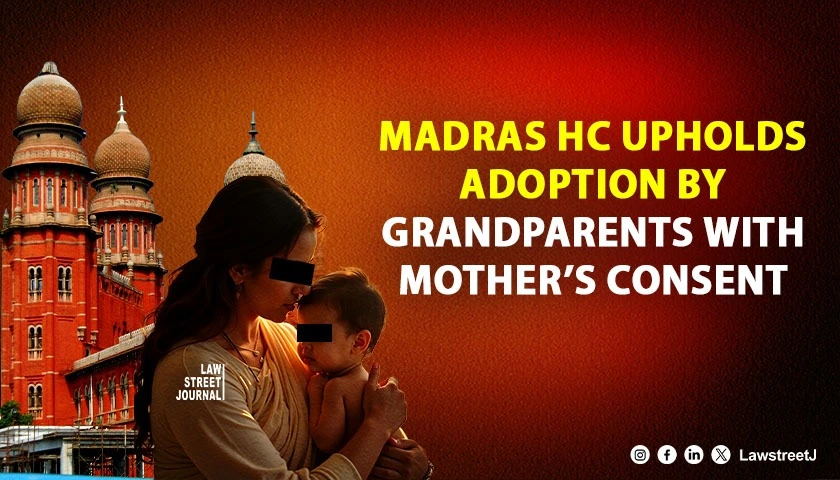Chennai: The Madras High Court has held that an adoption deed executed by grandparents with the concurrence of the biological mother is valid under the Hindu Adoptions and Maintenance Act, 1956 (HAMA), emphasizing that the Juvenile Justice (JJ) Act does not apply to adoptions governed by Hindu personal law.
Justice M. Dhandapani made significant observations on the interplay between HAMA and the JJ Act while deciding W.P. No. 39430 of 2025 filed by A. Kannan, who challenged the rejection of his request to register his adopted daughter’s birth certificate.
In this case, the petitioner and his wife, K. Sheela, married since January 27, 2006, had adopted a child born on April 26, 2022. The biological mother, aged only 18 at the time of birth, was assisted by her parents, P. Sakarapani and S. Sudha, in giving the child in adoption.
The adoption ceremony, ‘Datta Homam,’ was performed on May 5, 2022, followed by the execution of a registered adoption deed on September 7, 2022. A naming ceremony was held on October 2, 2022, and subsequently, the petitioner obtained a decree from the Principal District Munsif, Puducherry in O.S. No. 189 of 2023 declaring the child as his lawfully adopted daughter, which attained finality.
However, the Sub-Registrar rejected the petitioner’s request to enter the adoptive parents’ names in the birth certificate, claiming that only the District Magistrate under the JJ Act could issue adoption orders—and not civil courts.
Justice Dhandapani reiterated that Section 56(3) of the JJ Act expressly excludes HAMA adoptions from its ambit, observing:
“Nothing in this Act shall apply to the adoption of children made under the provisions of the Hindu Adoption and Maintenance Act, 1956.”
The court clarified that the JJ Act applies only to orphaned, abandoned, or surrendered children declared legally free for adoption, and cannot cover a child willingly given in adoption under HAMA.
Rejecting the argument that the adoption was invalid because the grandparents executed the deed instead of the minor mother, the court held that the mother’s concurrence is sufficient:
“The mere fact that the grandparents executed the adoption deed cannot invalidate it, so long as it was executed with the concurrence of the mother.”
On the attempt to invoke POCSO due to the mother’s minority, the court noted that such provisions apply only to the offender, and not to affect the validity of the adoption.
Calling out administrative overreach, the court held:
“Administrative orders cannot nullify a decree passed by a court of law.”
The court emphasized that both HAMA and the JJ Act are benevolent statutes meant to protect children, and criticized authorities for obstructing the child’s welfare.
Accordingly, the court set aside the impugned order and directed the Sub-Registrar to issue a fresh birth certificate incorporating the child’s name and the adoptive parents’ names within four weeks.
Case Title: A. Kannan vs. The Union Territory of Puducherry & Ors.




![TN Medical Council declares change of gender identity of LGBTQIA+ as misconduct [Read Notification]](/secure/uploads/2022/12/lj_5268_5cebb05a-97fb-40fb-8045-25cdf8f4207a.jpg)
![Madras High Court Directs Tamil Nadu Government to Ensure Quota for Transgenders in Local Body Elections [Read Order]](/secure/uploads/2023/08/lj_2507_7a03d113-08b1-4670-b6fb-9058aee481d0.jpg)
![Anti Corruption sleuths acted like "puppets in The Muppet Show", HC notice to ex TN CM in disproportionate assets case [Read Order]](/secure/uploads/2023/09/lj_8675_7b37fc02-1b2d-4f4a-9816-3df20545b37e.jpg)




